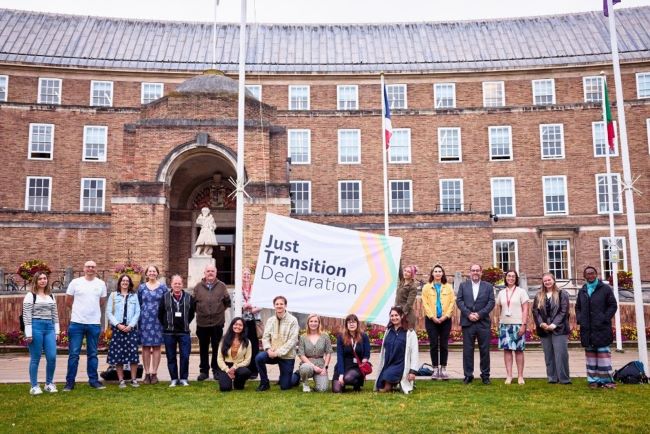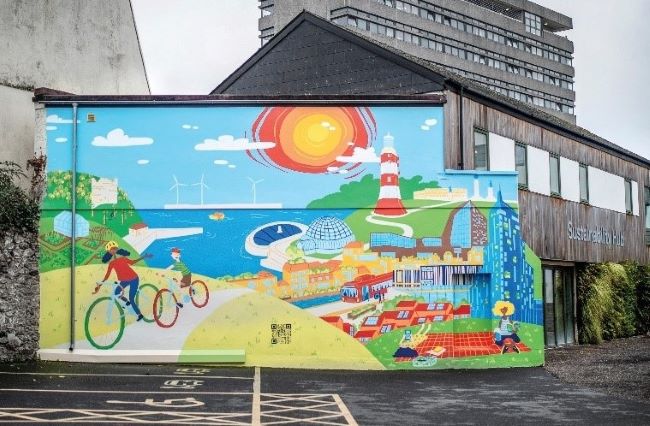Empower local action on net zero with a national framework
Urgent action is required to meet the UK’s next carbon budget. To achieve progress and maintain public support, recent research, funded by the British Academy, suggests the new UK government must work closely with devolved, regional, and local governments and proposes the development of a national framework to guide and empower action.
About the research
The UK’s credibility as a climate leader hangs in the balance. Decarbonising the UK’s electricity system has proven the most prominent feature of successful emission reductions to date. Going beyond this to meet the UK Government’s international and legal commitments to achieving net zero will involve accelerating greenhouse gas reductions across all other sectors of the economy. This includes housing, transport, agriculture and manufacturing, as well as adjustments to the everyday lives of individuals and communities across the UK.
Set within this context, the research seeks to understand the role that national net zero policymaking plays in the practice of attaining net zero delivery at a local level. Through synthesizing existing knowledge and evaluating local practice, the project seeks to generate practical insights about how to improve multi-level governance for net zero across the UK and in England in particular.
Key findings
Key findings
Concerted local action on net zero faces multiple challenges.
Since the UK announced its net zero target in 2019, a body of knowledge has grown at the interface of policy and practice on local, place-based net zero governance in the UK. It stresses both the commitment of local actors and the challenges involved in organising and delivering progress on net zero. In reviewing this body of knowledge, we have identified seven challenges:
- Coordinating between and within levels of government.
- Creating locally appropriate pathways.
- Creating shared knowledge bases.
- Fostering buy-in from multiple stakeholders.
- Making local decisions despite many unknowns
- Delivering cross-cutting activities to unlock local action.
- Resourcing local co-ordination and delivery.
Local action on net zero will require empowered local governance
Historically, the UK government has been responsible for setting emission reduction pathways and developing national decarbonisation strategies.
This approach has been effective in driving change in large infrastructure systems like the electricity sector. This review questions whether this approach will be as effective at successfully driving local change.
Instead, this review finds that concerted local action on net zero will increasingly depend on making decisions about what net zero means to local communities, town or regions. It will require the development of local visions, that respond to local needs and aspirations, and stakeholder buy-in to local decarbonisation pathways. In short, local action on net zero will require empowered local governance that is equally capable of organising to deliver change as it is of delivering change. Providing localities with the powers and resources to organise to deliver change will be essential. Right now, this is not the case.

Policy recommendations
Develop a UK-wide framework to support the local governance of net zero
The new UK Government is determined to support growth through governance reforms. Further reform as to how the UK governs the organisation and delivery of net zero has the potential to unlock local action and contribute to the UK’s next carbon budget. The need for an effective framework that sets out the roles and responsibilities of diverse public actors has been recognized for some time. The High Court decision requiring the UK government to revise and further justify its net zero strategy by May 2025 presents an opportunity to develop a UK-wide framework to support the local governance of net zero.
To be effective, the framework must help local actors navigate the seven challenges of organising to deliver
Proposals for current reforms are positive but must go further. They need to extend beyond energy systems, go beyond establishing new national actors to consider the importance of devolved, regional and local government, and expand the focus from delivery to coordinating multi-actor processes. To accelerate concerted local action on net zero, a framework must be created that helps local actors navigate the seven challenges of organising to deliver.
The table below suggests ideal outcomes to be achieved under a new national framework to unlock local net zero progress. The qualities of such a framework are not prescribed here. However, they should be developed with the challenges in mind and guided by desirable outcomes including, but not limited to, those listed.
Challenge for the framework to address: |
A successful framework would achieve: |
|---|---|
|
1. Effectively coordinating between and within governance scales |
Clearly defined roles, where responsibility is matched with the appropriate devolution of power. Long-term, consistent, and strategic policymaking from national government. Improved collaboration across departments, organisations, geographical boundaries, and scales. Having open and iterative feedback mechanisms between actors and across scales. |
|
2. Creating locally appropriate pathways |
Place-based policymaking that supports local visions of just transitions and accounts for local strengths and weaknesses. |
|
3. Creating shared knowledge bases |
Standardised, timely, and transparent data management, where relevant information is collected at appropriate scales. Effective mechanism(s) for sharing best practice and collective learning. |
|
4. Fostering buy-in from multiple stakeholders |
Meaningful engagement exercises carried out with the public, private sector, and civil society to build local visions and buy-in for net zero futures. Support for community and citizen-led action. |
|
5. Acting under uncertainty |
Empowered local leaders confident in taking innovative and experimental actions, alongside pushing ahead with no and low-regret options. Private sector confidence to invest in local areas. |
|
6. Delivering cross-cutting activities to unlock local action |
Recognition and dedicated resourcing for local cross-cutting activities. Aligning land-use planning and procurement policy with local net zero goals |
|
7. Resourcing local co-ordination and delivery
|
Increased, evenly distributed, and non-competitive funding for local actors, especially local authorities. Support for innovative financing arrangements in the public and private sector. Improved capacity at the local level, especially in local government, through increased access to skills and expertise. Sufficient resources (finance and staff) for organising to deliver (including resources specifically for addressing challenges 2, 3, 4 & 6). |

Further information
Project IMPERFECT (Implementing effective and just net zero policies) is funded by the British Academy as part of its Net Zero Governance policy programme. For further information on the research behind this briefing note see: McMillian et al (2024) Local, place-based governance for net zero: a review and research agenda.
Authors
Esmé McMillan, University of Bristol; Dr Jake Barnes, University of Oxford; Dr Colin Nolden, University of Sheffield; Professor Morag McDermont, University of Bristol.
